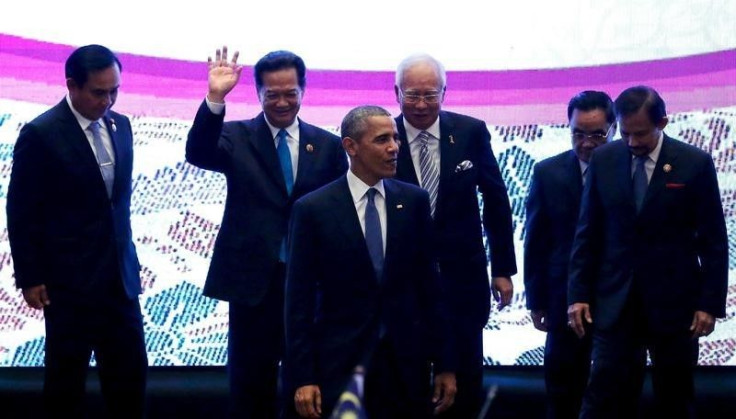China Says US Guilty Of 'Political Provocation' In South China Sea

KUALA LUMPUR (Reuters) - China said on Sunday that the United States was making political provocations with its patrols in the disputed South China Sea, as tensions around the strategic waterways mount.
China will continue to construct military facilities on artificial islands it is building, Vice Foreign Minister Liu Zhenmin told a news conference in Kuala Lumpur. The facilities are needed to protect the islands, he said.
Washington was testing Beijing with its insistence on "freedom of navigation" in the strategic waterway, he said.
China, which claims almost the entire energy-rich South China Sea, has been transforming reefs into artificial islands in the Spratly archipelago and building airfields and other facilities on some of them. That has prompted concerns in Washington and across the region that Beijing is trying to militarize its claims in the South China Sea.
Earlier this month, U.S. B-52 bombers flew near some of the artificial islands, signaling Washington's determination to challenge Beijing's claim. At the end of October, the USS Lassen, a guided-missile destroyer, challenged territorial limits around one of the islands.
"This time, in a very high profile manner, the U.S. sent military vessels within 12 nautical miles of China's islands and reefs," Liu said. "This has gone beyond the scope of freedom of navigation. It is a political provocation and the purpose is to test China's response."
Obama on Saturday called on countries to stop building artificial islands and militarizing their claims and said the United States would continue to assert its freedom of navigation rights in the sea.
Vietnam, the Philippines, Malaysia, Taiwan and Brunei also have territorial claims in the South China Sea.
Heads of government from 18 countries including the United States, China, India, Russia, Japan and Southeast Asia are meeting for the annual East Asia Summit, this year hosted by Malaysia.
Many of them came from Manila for the annual meeting of the Asia Pacific Economic Cooperation forum. The season of summitry has so far been dominated by calls for action over Islamic State's attacks in Paris and Mali, and bombings in Lebanon.
CONFRONT ISLAMIST EXTREMISTS
Countries with large populations of Muslims, including Russia, should unite to fight Islamic State, Russian Prime Minister Dmitry Medvedev said, after Islamist militants killed 19 people, including six Russians, in an attack on a luxury hotel in Mali.
Friday's assault came a week after militants killed 130 people in gun and bomb attacks in Paris claimed by Islamic State, and three weeks after a Russian airliner was downed over Egypt by what Moscow and Western governments say was a bomb, killing all 224 people aboard.
"We need a consolidated anti-terrorist position of those countries that have a large Islamic community, and incidentally Russia is one of these countries," Medvedev said at the East Asia Summit.
Malaysian Prime Minister Najib Razak opened the weekend series of meetings on Saturday, calling on world leaders to confront Islamist extremism.
"The perpetrators of these cowardly and barbaric acts do not represent any race, religion or creed, nor should we allow them to claim to do so," Najib said. "They are terrorists and should be confronted as such, with the full force of the law."
He said predominantly Islamic countries such as Malaysia have a duty to expose as lies the "ideology propagated by these extremists that is the cause of this sadistic violence."
Southeast Asian nations on Sunday established a formal community that attempts to create freer movement of trade and capital in an area of 625 million people with a combined economic output of $2.6 trillion.
The Community declaration was signed by leaders of the 10-member Association of Southeast Asian Nations.
"In practice, we have virtually eliminated tariff barriers between us," said Najib, the summit host. "Now we have to assure freer movements and removal of barriers that hinder growth and investment."
© Copyright IBTimes 2025. All rights reserved.





















